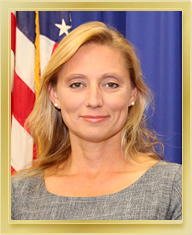
STATE REPRESENTATIVE
Michelle Cook

Serving the 65th Assembly District
Legislative Office Building, Room 4044
Hartford, CT 06106-1591
Capitol: 800-842-8267
Michelle.Cook@cga.ct.gov
Protecting the Elderly
This legislative year, we passed many more laws to protect our seniors from potential abuse. In situations where abuse or neglect is suspected, the Department of Social Services can now petition a probate court to gain access to that person’s home to make an assessment. For the purpose of these investigations, the definition of neglect has also been expanded to include elderly people who do not live alone, but whose caretaker fails to arrange for the necessary services to keep an elderly person healthy. We also passed laws that will keep nursing home and residential care home residents safer by requiring the Commissioner of the Department of Social Services to notify a resident’s designee of suspected abuse or neglect within 24 hours.
Establishing a Bill of Rights for Residents of Continuing-Care Retirement Communities
This year, we created a bill of rights for senior citizens living in continuing care retirement communities. This bill of rights gives residents a voice in decisions that affect them within these communities. It requires transparency regarding the financial stability of the facility, and notification to residents of major construction or any changes in ownership. It also gives residents more independence in making decisions about their medical care and assisted living services and requires reasonable accommodations for disabilities under the Americans with Disabilities Act.
Authorizing Pharmacists to
Dispense Drugs in 90 Day Quantities
Sometimes illness or difficulty with transportation can make it hard to get to the pharmacy to refill a monthly prescription. It also can be a challenge if you are heading south for the winter and need your medications. This session, we introduced legislation that enables you to get a 90 day supply. This will allow you to have a three-month supply of a prescription and not have to worry about getting to the pharmacy each month. Co-pays and other insurance restrictions still apply.
Patient Designated Caregivers
Some patients end up returning to the hospital soon after discharge because they had not been instructed properly on their follow-up care or were unable to follow instructions. A new law called the CARE (Caregiver Advise, Record, Enable) Act, requires hospitals to document a caregiver (who has been chosen by the patient) in the patient’s discharge plan. The hospital must attempt to notify the caregiver of the patient’s discharge, and to instruct the caregiver on any post-discharge tasks with which the patient will need assistance.
Preventing Substance Abuse and Opioid Overdose
According to 2013 data from the Centers for Disease Control and Prevention, more than half of the drug overdose deaths in the United States were related to pharmaceutical drugs. To help combat this public health problem, we passed legislation requiring prescribers (physicians, physician assistants, APRNs and dentists) to get trained in how to properly prescribe controlled substances. If prescribing more than a 72-hour supply of any controlled substance, the practitioner must check the patient’s record in the prescription drug-monitoring program, and report those prescriptions to the program immediately. Pharmacists will also be allowed to prescribe opioid antagonists, used to treat drug overdoses, if they receive special training and certification to do so.
Budget Compromise
This year, the legislature worked diligently to adopt a budget that represents the wide-ranging priorities of our diverse state. Facing projected deficits over the next two years, over a billion dollars of cuts have been made to the current services biennium budget, and over $130 million was cut from the Appropriations proposed budget. General Fund spending growth is under 4%, and millions will be saved through reductions in state employee workers’ compensation costs and cancelling of overtime. The budget is balanced, under the spending cap, and invests in Connecticut’s transportation infrastructure which is critical to our economic future. By investing in transportation projects, such as roads, bridges, and ports, we are encouraging smart growth and bringing sustainable jobs home to Connecticut.
Most car owners will see a cut in their motor vehicle tax beginning in 2016 as we capped the car tax mill rate statewide at 32 mills for July 2016 and 29.36 mills in July 2017. No one’s car tax goes up under this plan.
In addition, increased state aid for every city and town will allow municipalities to lower their mill rates. This lessens the property tax burden currently borne solely by families and small businesses in our community.
Towns with a larger number of tax-exempt properties (e.g. state property, churches, colleges and hospitals) receive additional aid for further property tax relief as well. Military veterans’ retirement pay will now be 100% exempt from the state income tax.
Assistance for Veterans
This year, we advanced legislation that recognizes the important sacrifices that veterans have made while defending our country. We have increased services available to veterans on state college and university campuses; established the Connecticut Women Veterans’ Program; created the Veterans to Agriculture Program and we are ensuring veterans have housing.
Students With Dyslexia
This year, we directed the State Department of Education (SDE) to designate a point person who will help parents and local boards of education identify students with dyslexia and intervene with appropriate help. Teachers-in-training will now be required to undergo 12 hours of preparation in effective literacy instruction using current best practices. Finally, the legislature granted the SDE an extension in their rollout of new reading assessments that will help identify students at risk for dyslexia. The additional time ensures successful implementation of a terrifically important program.
Reducing Required Testing In Schools
Standardized tests have recently come under a lot of scrutiny. One area of concern is that there are simply too many tests. Juniors in high school are required to take the SBAC exam at a time when many are already taking college admission tests like the SAT and ACT. We passed a law that waives the SBAC test for all 11th graders and replaces the exam with a free SAT test.
Student Loan Rates Drop
The Connecticut Higher Education Supplemental Loan Authority (CHESLA) announced that it will offer a fixed interest rate of 4.95 percent for new student loans, down from its current rate of 6.75 percent. Not only is this the lowest rate that CHESLA has ever offered, it is also significantly lower than the new federal PLUS loan rate of 6.84 percent.
